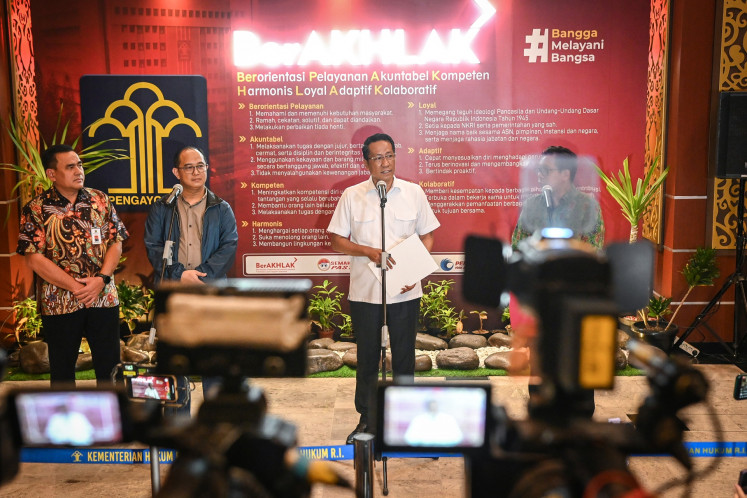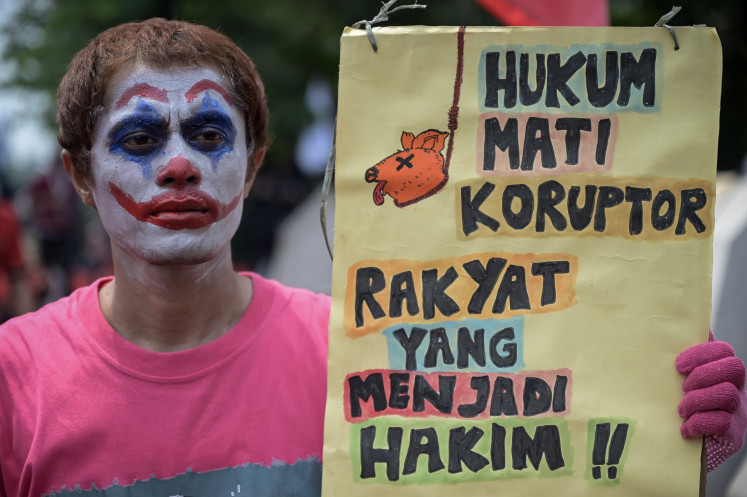Popular Reads
Top Results
Can't find what you're looking for?
View all search resultsPopular Reads
Top Results
Can't find what you're looking for?
View all search results‘Islamic Populism’ - A critical approach to studying political Islam
Islamic Populism in Indonesia and the Middle East By Vedi R
Change text size
Gift Premium Articles
to Anyone
Islamic Populism in Indonesia and the Middle East
By Vedi R. Hadiz
Cambridge University Press, 2016
228 pages
The relationship between Islam and politics continues to be a pertinent aspect of the study of religion and politics.
In the mainstream approach to the study of religion and politics, the main research questions typically revolve around the (in)compatibility of Islam and liberal democratic institutions and ideas — electoral politics, the market economy and civic values.
Such an approach, however, has become an orthodoxy and is pervasive in studies of political Islam, especially in the Indonesian context. Vedi Hadiz’s Islamic Populism in Indonesia and the Middle East manages to challenge the mainstream approach and offers a refreshing way of studying the trajectory of political Islam in Indonesia, Egypt and Turkey in relation to capitalist development.
Vedi traces the evolution of “Islamic populism” — a cross-class alliance in the name of the ummah (the Islamic masses) against elites formed in response to the contradictions of development — in the three countries under study.
Covering a period from the anti-colonial struggle all the way to the neoliberal phase of capitalism, Vedi focuses on several key historical contingencies — the early period of nation-state building, the heyday of capitalist development during the Cold War, and the current era of electoral democracy and neoliberalism.
Through a structuralist and comparative historical analysis, Vedi shows how material factors — class relations and conflicts in the struggle for economic resources and state power — explain the varying strategies of Islamic populist forces in the three countries, from rebellion at the margins to an embrace of electoral democracy and market reforms.
The key element for the success of Islamic populism is whether it is able to consolidate a cross-class alliance connecting the lower and middle classes as well as the large bourgeoisie from a Muslim background and “mainstream” its politics through electoral participation.
This is what the Turkish Justice and Development Party (AKP) has managed to do, something which its Egyptian and Indonesian brethren — the Muslim Brotherhood and the Prosperous Justice Party (PKS) — have not succeeded in yet due to their lack of access to big capital (the military in Egypt and the Chinese in Indonesia) and the relative absence of significant Muslim capital in the two countries.
The rise of the Islamic-oriented capitalists in Turkey — also known as the Anatolian bourgeoisie — was made possible due to the shift toward a more export-oriented economic policy in 1990s, further integrating the Turkish economy into the global market. This shift sidelined the secular yet state-dependent Kemalist bourgeoisie and paved the way for the solidification of a cross-class alliance of Anatolian businesses, middle-class professionals, and urban lower-classes which became AKP’s social base.
It is important to note however that a particular historical context specific to Turkey allows for the ascendency of “native” Turkish bourgeoisie — whether it is Kemalist or Islamic: the displacement of the Greeks, Armenians, and Jews — the business-oriented minorities — in the process of post-Ottoman Turkish state formation.
Theoretically informed and empirically rich, Vedi’s work is a breakthrough in the study of political Islam in Indonesia.
While his is not the first work using a Marxian or critical materialist approach in studying political Islam in general, it is safe to say that Islamic Populism is a novel and innovative book in the study of Indonesian political Islam.
It debunks the culturalist and essentialist view of the relationship between Islam and modern politics in Indonesia and reorients the scholarly debate in that field.
Furthermore, while its theoretical approach is clearly materialist, it does not exclude ideational factors. Rather, it looks at the interaction between the two and its impact on the political articulation of Islamic populism. This is in sharp contrast with the existing literature, which reinforces the moderate-conservative dichotomy of Indonesian Islam and overemphasizes cultural and ideational factors in understanding it.
However, one thing is missing from Vedi’s work: a deeper engagement with the comparative politics literature on religion and politics. More specifically, Vedi could have looked at works on Christian Democracy in Western Europe (for instance by SN Kalyvas, 1996) and Hindutva or Hindu Nationalism in India (Thachil, 2011) and draw parallels between them and their Islamic populist brethren.
Albeit different in many ways, these religious populists share something in common: an emphasis on cross-class alliance, the construction of civil society institutions with state-like and service-provision capacities, the religious appeal to the masses, and, in recent years, neoliberal or market-oriented economic policies.
By engaging with this set of literature, Vedi could have challenged the myth of Islamic exceptionalism more comprehensively and therefore strengthened his thesis.
All in all, Islamic Populism deserves appreciation for offering a fresh perspective in the study of political Islam and analyzing its trajectory in different Muslim countries in a new way. This is progress compared to many earlier works on political Islam, particularly in the Indonesia context.
A critical materialist approach in studying political Islam has been long overdue and Islamic Populism provides a good exemplar for future works in this vein.










